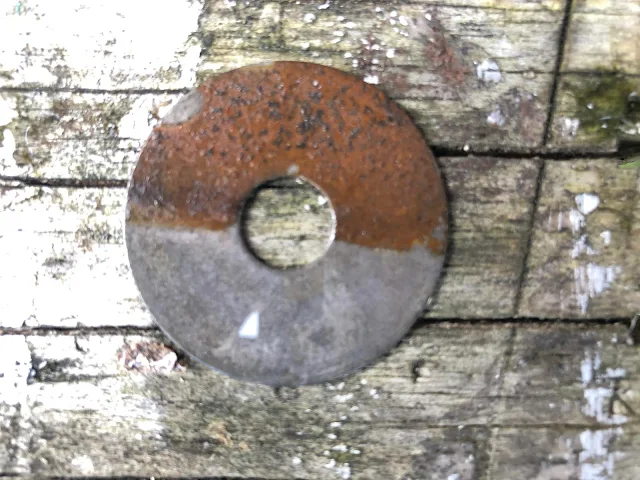✨The Ultimate Guide to Removing Rust Stains at Home
The results you can achieve from restoring items covered in rust can be truly incredible.
From old spanners and knives to gardening shears and padlocks, many household tools can be brought back to life with a little care.
There are many handy tricks you can use to remove rust, from gentle home remedies to heavy-duty methods using strong acids.
Let's explore what really works and dive into the science behind rust and its removal.
The Science of Rust: What is It and Why Does It Form?
Rust is the common term for iron oxide, the reddish-brown flaky substance that forms when iron or steel is exposed to oxygen and moisture. This chemical process is called oxidation.
The presence of salt, acids, or other chemicals can significantly accelerate this process. This is why tools and fixtures in coastal environments tend to rust much faster; the salt in the air acts as an electrolyte, speeding up the chemical reaction.
🛒Popular Commercial Rust Removal Products
If home remedies aren't cutting it, here are some popular and effective commercial products:
- Naval Jelly: A classic gel-like rust remover that clings to surfaces.
- Evapo-Rust: A water-based, non-toxic rust remover that works through chelation and is safe for a wide range of metals.
- CLR Calcium, Lime & Rust Remover: A versatile liquid cleaner for rust and mineral deposits.
- Metal Rescue Rust Remover Bath: An immersion solution perfect for soaking heavily rusted parts.
- Zep Heavy-Duty Citrus Degreaser: A great option that removes rust as well as grease and oil.
🍳Simple Home Remedies for Rust Removal
There are several simple home-based remedies that can be used to remove rust from items like scissors, gardening tools, or from sinks and tubs. Here are some tried-and-true methods:
- White Vinegar and Baking Soda: Mix equal parts to create a paste. The fizzing reaction helps lift rust.
- Lemon Juice and Salt: The citric acid in lemon juice dissolves rust, while the salt acts as a gentle abrasive.
- Coca-Cola: The phosphoric acid in Coke can dissolve light rust when soaked overnight.
- Potatoes: Cut a potato, dip it in baking soda, and rub it on the rust. The oxalic acid in the potato does the work!
- Steel Wool: For more stubborn rust, steel wool can be used to scrub it away, but be careful not to scratch the underlying metal.
- Sandpaper or Wire Brush: For more severe rust, these mechanical methods can be very effective.
How do these home remedies actually work?
Baking Soda and Vinegar: This creates a classic acid-base reaction. The acetic acid in the vinegar reacts with the baking soda (sodium bicarbonate) to produce carbonic acid and carbon dioxide gas. This fizzing action physically lifts the rust particles, while the baking soda acts as a mild abrasive to scrub them away.
Lemon Juice and Salt: This works through a process called chelation. The citric acid in the lemon juice is a natural chelating agent, meaning it chemically bonds to the iron ions in the rust, pulling them off the surface and into a soluble form that can be easily wiped away.
🧪Using Stronger Chemicals: Hydrochloric Acid
For very heavy rust, sometimes a stronger approach is needed. Hydrochloric acid (HCl) is a powerful mineral acid that can effectively dissolve rust by breaking down the iron oxide into water-soluble iron chloride.
The chemical reaction is: Fe₂O₃ + 6HCl → 2FeCl₃ + 3H₂O.
Critical Safety Warning: Handling Hydrochloric Acid
Using hydrochloric acid can be dangerous and should only be done with proper safety precautions. It is highly corrosive and can cause severe skin burns, eye damage, and respiratory problems.
Always wear heavy-duty gloves, goggles, and a respirator mask in a well-ventilated area. If you are not familiar with handling strong chemicals, it is highly recommended to use a safer commercial product instead.
After-Treatment is Crucial!
After using any acid to remove rust, you must follow these steps to prevent the rust from returning immediately:
- Neutralize the Acid: Rinse the metal thoroughly with a baking soda and water solution to neutralize any remaining acid.
- Rinse with Water: Wash the metal with clean water to remove all traces of the acid and baking soda solution.
- Dry Completely: The metal must be dried immediately and thoroughly. Any remaining moisture will cause it to "flash rust."
- Protect the Surface: Apply a rust inhibitor or a light coat of oil to the bare metal to create a protective barrier against oxygen and moisture.

